Nov 29, 2024 | Editors' Blog
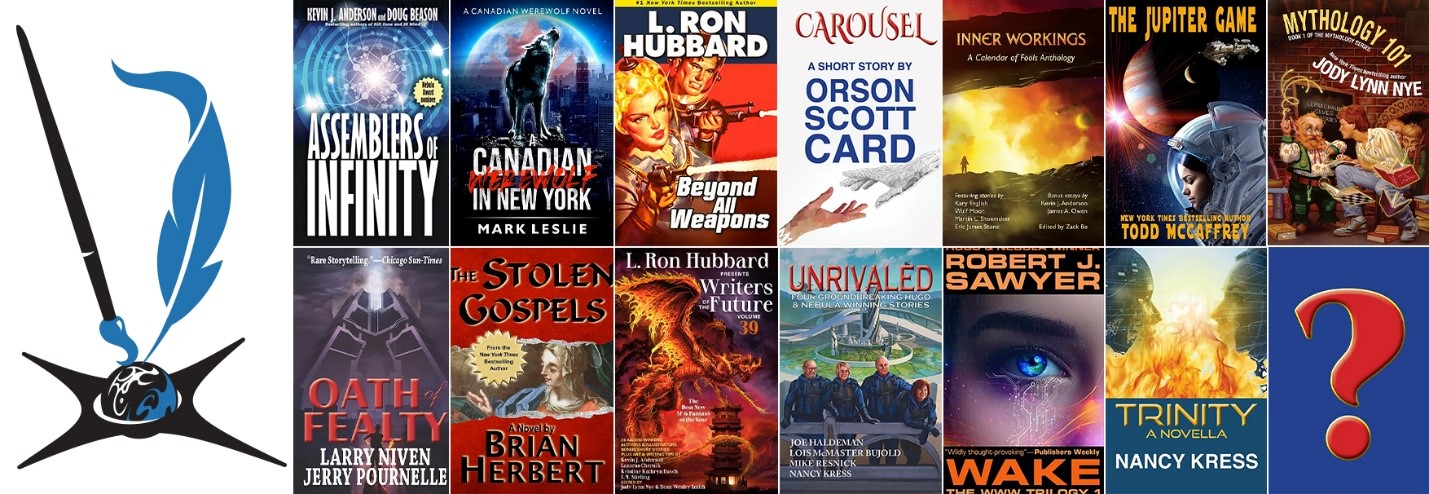
A Sci-Fi Book Bundle Deal so Good
Your E-reader will Think you Won the Lottery
==============================
A Sci-Fi Book Bundle Deal so Good
Your Friends will Wonder Where you Disappeared to
=================================
Christmas Comes Early for Sci-fi Fans:
A Book Bundle Beyond Compare
At a Price You’ll Never Believe
==============================
I am a big reader. In fact, I have been reading science fiction for as long as I can remember.
As a bookworm, I’m always looking for opportunities that let me escape to the great unknown while also being easy on the wallet.
Well, I found one so good that I must tell everyone! You’ll be glad that Books Go Social is excited for me to share it with you on their blog.
This is a science-fiction deal you won’t want to miss out on. But you’ll need to act fast as it expires December 11 at midnight.
This eBook collection consists of books, novellas, and short stories from L. Ron Hubbard’s Writers of the Future Contest winners AND the judges (all mind-blowingly fantastic, best-selling writers).
The list of professional and award-winning authors in this collection is astonishing.
I’m also looking forward to the newer authors, who were hand-picked as winners by these masters. These writers had their stories chosen from thousands of submissions for their Writers of the Future award, and here are their next, newest creations!
You can choose between the base bundle of five books or the super bundle with nine more titles (a total of 14).
The base bundle:
1. Assemblers of Infinity by Kevin J. Anderson and Doug Beason
“Wonderfully vivid, Terrifying, and worse yet … realistic! ” —David Brin, author of Startide Rising
2. Unrivaled – an anthology of 4 Hugo and Nebula-winning stories by Joe Haldeman, Lois McMaster Bujold, Mike Resnick, and Nancy Kress
“Four of the most Outstanding and most acclaimed novellas in science fiction….”
3. The Stolen Gospels by Brian Herbert
★★★★★ “Thought-provoking fiction and thoroughly recommended book.”
4. Beyond All Weapons by L. Ron Hubbard
“A thrilling space adventure … the terror and excitement builds through to the end.” —Publishers Weekly
5. Trinity by Nancy Kress
“Every story is beautifully crafted and realized; all will leave readers excited and alert.” —Library Journal
The expanded bundle includes all of the above, plus:
6. Carousel by Orson Scott Card
★★★★★ “Lots of fun”
7. A Canadian Werewolf in New York by Mark Leslie
★★★★★ “Fast-paced, entertaining, and hilarious.”
8. The Jupiter Game by Todd McCaffrey
★★★★★ “Engaging and captivating. In a word, it’s a spellbinder.”
9. Oath of Fealty by Larry Niven and Jerry Pournelle
“Rare Storytelling…demands to be read at one sitting.” —Chicago Sun-Times
10. Mythology 101 by Jody Lynn Nye
“Wonderfully whimsical.” —Anne McCaffrey
11. Wake by Robert J. Sawyer
“Wildly thought-provoking. The thematic diversity — and profundity — makes this one of Sawyer’s strongest works to date.” —Publishers Weekly
12. Inner Workings: A Calendar of Fools Anthology featuring 12 short stories and essays by many Writers of the Future contest winners.
★★★★★ “Top-shelf stories. I had to make myself slow down.”
13. Writers of the Future Volume 39
“This is a treasure of extraordinary journeys beyond the boundaries of imagination—a “must-read” for science fiction and fantasy connoisseurs. Highly recommended!” —Midwest Book Review
14. Surprise Novel by a New York Times bestselling author
There’s so much I could say about the nine books in the expanded bundle: zombies, werewolves, aliens, spaceships, apparent utopias versus dystopia, elves living amongst us, artificial intelligence taking over, and every other sci-fi concept that hooks readers from the very first page! You won’t be disappointed.
The best part is that the price is so low you’ll think Christmas is early!
On Amazon, all the books in the base bundle, would cost $27, but with this special deal, the suggested price is $8! (Note: you can change the price to anything if it meets the minimum price requirement of $4.) CLICK HERE TO BUY ONLY THE BASE BUNDLE
The expanded bundle would cost over $71 on Amazon, and with this offer, the suggested price is $20 (with a minimum price of $12.) That is a 70% discount! CLICK HERE TO BUY ONLY THE ENHANCED BUNDLE
Also, 70% of your payment will go to the authors.
After you make your purchase, you will receive an email within 24 hours containing a link to download all of the books in ePub format. Visit the site for more details: https://www.arcmanorbooks.com/bundle
I won’t be blogging until after Christmas because I’m clicking on the enhanced bundle right now!
Can you believe an offer this good showed up in my feed?
Join me and tell me which story becomes your favorite.
John Carey
Bio:
John Carey has degrees in Chemical Engineering and Computer Science from Texas A&M University which paid the bills while he crafted his writing skills at nights and weekends. John is a frequent blogger providing insights on classic science fiction stories and also covering writing contests. He has recently published his second book, Not Worthy of the Air you Breathe set in the future where nations have taken a cue from the business world and terminate their low-performing citizens at the end of each year.
Nov 7, 2024 | Editors' Blog
We recommend this book to fans of epic, character-driven sagas with intricate mythology, intense quests, and themes of identity and destiny.
.
Which line stood out from all the others in the book?
“Stop calling me a coward!” Adir yelled. He’d had enough of that kind of talk. Boar laughed derisively.
General Summary for Context:
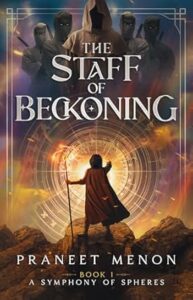 This gripping story follows a protagonist whose quiet life is shattered when he’s falsely accused of murder after an unexpected death. Forced into exile, he becomes the target of a deadly secret society whose motives remain hidden from him. As he flees, he uncovers ancient prophecies that seem eerily connected to his plight, propelling him into a quest that unveils his crucial role in the fate of the world.
This gripping story follows a protagonist whose quiet life is shattered when he’s falsely accused of murder after an unexpected death. Forced into exile, he becomes the target of a deadly secret society whose motives remain hidden from him. As he flees, he uncovers ancient prophecies that seem eerily connected to his plight, propelling him into a quest that unveils his crucial role in the fate of the world.
Through twists of mystery, danger, and discovery, he unravels the true depth of his destiny in this thrilling fantasy tale.
.
Concise Review:
The book immerses readers in the richly dark and fictional realm of Leakarha, where prophecy, myth, and fate collide on an epic scale. At the heart of the story is a young man from the quiet village of Marafel, whose dreams of a life beyond his peaceful upbringing are abruptly shattered after a mysterious death brands him as a murderer. Forced to flee, he’s drawn into a web of revenge and danger, accompanied by his girlfriend—though their bond frays as trust erodes and their paths diverge. His relationship woes are further complicated when he encounters another woman from a different clan, sparking a new, complex connection.
Unbeknownst to him, he is relentlessly pursued by the Khasmia Shadow, a secret society determined to wield the legendary Staff of Beckoning to rid the world of an ominous force known as the Venna. His journey of self-discovery propels him into the heart of the epic struggles that define Leakarha, and he soon realizes that his fate may hold the key to the world’s destiny.
A beautifully crafted dark fantasy, this novel is a must-read for fans of intricate lore, ancient prophecies, and hidden secrets. It’s a captivating adventure that pulls readers into a realm where battles are fought with stakes of legendary proportions. Highly recommended for those who revel in the allure of dark fantasy.
.
General Thoughts on the Novel:
This novel subtly explores themes of identity, destiny, and purpose through its protagonist, who begins as a carefree, happy-go-lucky figure. But a series of mysterious events label him a murderer, forcing him to flee his homeland and search for a new life in the far reaches of this dark, richly imagined fantasy world. The plot is intricate, weaving together a mythic history, societal divides, and moral dilemmas that lend a high-fantasy depth to the tale. The protagonist is masterfully developed, with the author delving into the fragile nature of his mind as he struggles to navigate his shifting emotions and confront the unfolding challenges before him.
With an ambitious scope reminiscent of The Wheel of Time, the story excels in its character depth, philosophical themes, and meticulous world-building. Its complex layers—logical, philosophical, psychological, and societal—add a satisfying richness. The story derives its strength from the seamless blending of mythology, reality, and fantasy, creating a multifaceted narrative that will resonate with fans of character-driven fantasy who are drawn to intricate explorations of identity and destiny.
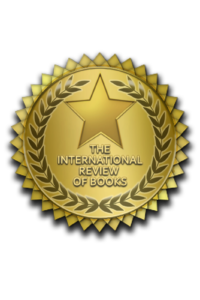 This debut novel stands out for its immersive world-building and thoughtful, layered storytelling. For those who appreciate dark fantasy mixed with mythology and complex character arcs, this book is a must-read. As the first installment in a series, it promises an epic journey that will captivate lovers of high fantasy. Highly recommended for fans of elaborate, character-driven sagas.
This debut novel stands out for its immersive world-building and thoughtful, layered storytelling. For those who appreciate dark fantasy mixed with mythology and complex character arcs, this book is a must-read. As the first installment in a series, it promises an epic journey that will captivate lovers of high fantasy. Highly recommended for fans of elaborate, character-driven sagas.
.
The Staff of Beckoning is available on Amazon.
Nov 1, 2024 | Editors' Blog
Today, we’re talking with Harker Jones about his book, Never Have I Ever
 Tell us something unexpected about yourself!
Tell us something unexpected about yourself!
I’m in Mensa. I took the test on a lark, and holy wow! I got in!
Why do you write?
To reach people. Whether they laugh or cry or throw the book across the room in anger, that means they were so moved that they had a visceral reaction. They’ll remember the story and the characters forever. And that’s priceless. Don’t get me wrong, I want money and awards, too! But that’s gravy!
Where did you get the inspiration for your current book?
I liked slasher movies and was a bored 17-year-old living on a dirt road in Michigan and, being a writer, I had quite an imagination, so I just went with it! I then turned it into a screenplay and have just turned it back into a novel. That’s why my inspiration came when I was 17, and it is also my current book! The journey has been fascinating, with these characters and their world. They changed a lot through the years yet also remained steadfast in what they always were.
What do you enjoy the most about your genre?
I don’t have just one genre, but I enjoy the same thing about all of them: telling good stories with memorable characters, whether it’s horror, comedy, children’s, or drama. I enjoy creating the worlds and the characters and setting them off on fantastic travels because I get to take those journeys with them. I’m just along for the ride as the characters reveal everything to me!
How would you describe your writing process?
I sit my butt in the chair and do it. That doesn’t mean I incite inspiration on command, but once I am inspired, I just sit down and do it. I always have a number of projects in the mix, so I can rotate them, coming at each of them fresh. Sometimes it’s a first draft, sometimes it’s a full edit, sometimes it’s inputting notes I’ve taken. It’s always fun no matter what part of the process I’m in, though!
What do you think authors have to gain from participating in social media?
I think it’s a great way to connect with both readers and other authors. There’s a huge support system out there, and you might as well take part in it. We all need support sometimes!
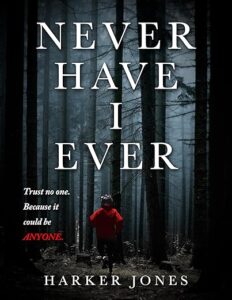 What advice would you have for other writers?
What advice would you have for other writers?
Sit your butt in the chair and do it. Don’t wring your hands and go on social media and moan about how you can’t come up with a name for your character or your blinking cursor on a blank page is taunting you. Put in a placeholder name and just start. You’ll likely toss much of it, but you’ll find something in there worth keeping. There’s no excuse for not doing it. Just START. Soon, you’ll find that the train has truly left the station, and you’re on the journey.
How do you select your books’ titles and covers?
The titles just come to me based on the material. I do steer away from generic titles like “The Title” and “The Book.” You know what I’m saying. I don’t want to say the name of any real projects with titles like that, though I probably couldn’t, because they are so forgettable! I scour the internet for images that reflect the book’s tone and story and then purchase them and send them to a graphic designer to tweak so that they even better reflect the project. I go back and forth with the designer on the font, size, and placement of the text so that it’s just right. I’m really surprised by how many books out there — both self-published and traditionally published — have covers that scream AMATEUR. It doesn’t take much time, effort or money to get a professional-looking cover, and it matters SO MUCH, just as the title does! Create a title that stands out. It doesn’t have to be a crazy, weird title, but something with a little panache that still represents your story.
What’s your next step?
My next step is getting my children’s book “The Bird Who Was Afraid to Fly” designed and published. I have the illustrations, it’s simply having the time to prioritize it! I also will be doing interviews for “Never Have I Ever” and pitching my screenplays and we’re in pre-production on a comedy short I wrote. It never ends! (In a good way!)
What book do you wish you’d written?
So many! I guess I’ll go with “House of Leaves” by Mark Z. Danielewski. It was endlessly creative. I would never in a million years have thought to structure a story the way he did!
How do you react to seeing a new review for your book?
Well, it starts with a dopamine rush because it’s like Christmas morning when you’re 8. Then there’s a rush of anxiety because I don’t know what the review will be. And then I celebrate when it’s positive, telling friends and family via social media, and just move on when it’s negative. Not everyone is going to love you and that is OK. Though it does suck every time!
FIND HARKER’S BOOK ON AMAZON
Nov 1, 2024 | Editors' Blog
Today, we’re talking with Michael Eves Shaffer about his book, Firing of the Crucible
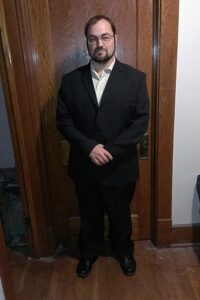 Tell us something unexpected about yourself!
Tell us something unexpected about yourself!
Almost every Friday and Saturday night for over a year I was in a live cast for Rocky Horror Picture Show. The only roles I never played were those of Magenta, Janet and Columbia. Primarily because my girlfriend at the time covered those. This included one weekend were the entire rest of the cast was out due to deployments and illness. So she and I did the show ourselves. I generally played Riff Raff otherwise.
Why do you write?
Mostly because I enjoy it. Once I get into the flow it’s fascinating to see where the characters will go and how the world evolves.
Where did you get the inspiration for your current book?
Most of my inspiration comes from life experiences coupled with a optimistic view of where I feel we, as a race, should go. I draw a lot of inspiration from other writers and even shows. But also a healthy mix of history and science.
What do you enjoy the most about your genre?
Fantasy is my second favorite genre. Science Fiction being at the top. But that’s because in fantasy you can do anything; there are no real limits to what you can make your universe do. With Science Fiction, you are bound to reasonable science-based, solutions and problems.
How would you describe your writing process?
I have a general outline in my head for where I want a book to start and finish. I come up with points I need to hit along the way. I put most of that on paper. Then, I sit down to write the first scene. From there, if I’ve done things correctly, it just takes off. Sometimes, it is almost writing itself. If I try to keep things real, then quite often, one scene will organically lead to the next. One good example was the two I set up to be antagonists of each other. Only when I started writing the scene did I realise there was no way someone as intelligent as I was writing to her would be willing to throw everything away just for ego. So, midway through the scene, she flips and fully supports the actions she was getting ready to condemn. She stunned everyone else in the room and thus gained even more power than she already had. So, my process? Go with the story, not my ego.
What do you think authors have to gain from participating in social media?
Other than a good way to get in front of a large audience, I can’t think of much.
 What advice would you have for other writers?
What advice would you have for other writers?
Know where you want to wind up with the story. Then, as I said above, Go with the story, not your ego.
How do you select your books’ titles and covers?
Titles just come to me. Covers, I try to find an artist and work with them on a particular scene. Usually, later in the book
What’s your next step?
Write the next book.
What book do you wish you’d written?
I’m not sure about this question. I’m not sure I can answer that until after I’m dead and on my way to Fiddler’s Green.
How do you react to seeing a new review for your book?
Any review of my book I appreciate. At least if it’s clear they read it. Positive reviews are great, but negative reviews can be useful as well. Letting you know if you are missing something.
FIND MICHAEL’S BOOK ON AMAZON
Nov 1, 2024 | Editors' Blog
Today, we’re talking with J G Cope about his book, Made & Unmade
 Tell us something unexpected about yourself!
Tell us something unexpected about yourself!
I can make an arrowhead from a rock. This is an insight into my psyche. I’ve always had an interest in history and anthropology. Twenty years ago a neighbor showed me an “arrowhead” he had found. The question got stuck in my head, “How’d they do that?” It became an obsession to learn how.
Why do you write?
Strictly for my own entertainment, as a hobby. Whether or not my writing is good enough for a wider audience can only be answered one way: by tossing it out there and seeing what happens. So, here we go…
Where did you get the inspiration for your current book?
To a large extent it’s a story (in bits and pieces) that has been floating around in my head for over thirty years. I’m not sure why I decided to write it down.
What do you enjoy the most about your genre?
It allows for vast freedom and brutal honesty, like a no-holds-barred barroom brawl.
How would you describe your writing process?
It starts with what I call a “seed,” which can be anything, but for me is usually a question, “What would happen if…?” I try to ignore it; writing a novel is a long and taxing endeavor! If the idea keeps coming back to me, it eventually sprouts. That’s when I know I’m in trouble. From there, it hits what I call “the weed patch stage,” snippets of characters, dialogue, and scenes start filling my head. At that point, I’m stuck, the only way to control the process is to write it down. From there a novel forms from two processes, what I call “thinking about writing” and “actual writing.” Thinking about writing happens from outside of the story. It is the brainstorming and setting of the organizational structure of the story (managing the weed patch). Actual writing happens from inside the story. It is when I get to go inside the scenes and actually experience them, then try to write them down so the reader can also experience them. This is the fun part, where all kinds of unexpected things can happen.
What do you think authors have to gain from participating in social media?
More than anything else, exposure. Somewhere out there in the world is some group of people interested in reading just about anything one can think of to write about. Social media can cast the wide net to find them.
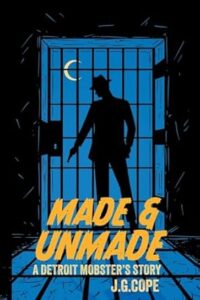 What advice would you have for other writers?
What advice would you have for other writers?
Being brand new at this, I have no valid advice to give. For me, personally, the advice I give myself: do it your own way. Don’t try to copy anyone else. Find your own voice. Tell the story you want to tell, how you want to tell it, then toss it out there and find out if it’s any good.
How do you select your books’ titles and covers?
With an incredible amount of help and guidance from the fine professionals at Alkira Publishing.
What’s your next step?
I have already written quite a few other manuscripts. Using what I learn from going through this first (and very scary) publishing process, I hope to let at least a few of my other stories see the light of day. Regardless, it’s a hobby for me, so I’m always working on writing something.
How do you react to seeing a new review for your book?
At the basic, emotional level, with anxiety. In the logical, human being sense, as an opportunity to learn. It makes no difference what I, as an author, am trying to say or how I perceive the story. All that matters is what the reader sees and how they feel about it.
FIND COPE’S BOOK ON AMAZON
Nov 1, 2024 | Editors' Blog
Today, we’re talking with Elizabeth Flanders about her book, Sam, Maddie, and the Mirror Dragon
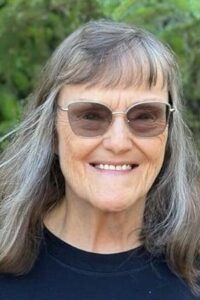 Tell us something unexpected about yourself!
Tell us something unexpected about yourself!
Publishing this book, *Sam, Maddie, and the Mirror Dragon: Two Inspired Teens and Their Quest to Discover Mother Earth’s Secrets*, was quite unexpected. During covid my 10-year-old grandson was home alone with online school while my daughter and son-in-law worked outside the home, so he and I zoomed a lot. We share a love for nature and for fantasy books, and when he went back to in-person school, I missed him and spontaneously started writing a story, a love letter to Mother Earth which included a boy and a dragon. Through a series of miraculous synchronicities, the resources to publish the story appeared. This book is an unexpected gift.
Why do you write?
I love the magical feeling of a story revealing itself to me.
Where did you get the inspiration for your current book?
I got the inspiration for this book from my grandson who has said since he was very small that he came here to help Mother Earth and from my own sense of awe and wonder when within the natural world.
What do you enjoy the most about your genre?
I enjoy being taken into another world and lifted up!
How would you describe your writing process?
My writing happens spontaneously. After I have a good story, I schedule time to proof and edit.
What do you think authors have to gain from participating in social media?
Participating in social media allows us to engage with people from all over the world.
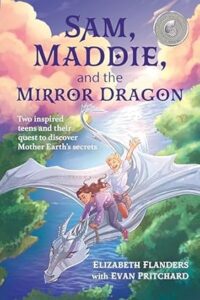 What advice would you have for other writers?
What advice would you have for other writers?
Write about what you know and are passionate about.
How do you select your books’ titles and covers?
It’s SO wonderful to hear how others have enjoyed my story.
What’s your next step?
My next step is to widen the audience for my book.
What book do you wish you’d written?
The *Dragons of Pern* series by Anne McCaffrey
How do you react to seeing a new review for your book?
It’s SO wonderful to hear how others have enjoyed my story.
FIND ELIZABETH’S BOOK ON AMAZON



 This debut novel stands out for its immersive world-building and thoughtful, layered storytelling. For those who appreciate dark fantasy mixed with mythology and complex character arcs, this book is a must-read. As the first installment in a series, it promises an epic journey that will captivate lovers of high fantasy. Highly recommended for fans of elaborate, character-driven sagas.
This debut novel stands out for its immersive world-building and thoughtful, layered storytelling. For those who appreciate dark fantasy mixed with mythology and complex character arcs, this book is a must-read. As the first installment in a series, it promises an epic journey that will captivate lovers of high fantasy. Highly recommended for fans of elaborate, character-driven sagas. Tell us something unexpected about yourself!
Tell us something unexpected about yourself!
 Tell us something unexpected about yourself!
Tell us something unexpected about yourself!
 Tell us something unexpected about yourself!
Tell us something unexpected about yourself!
 Tell us something unexpected about yourself!
Tell us something unexpected about yourself!

